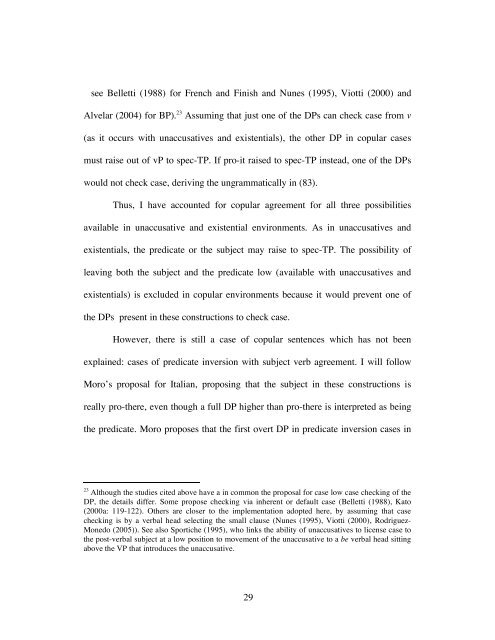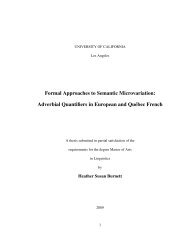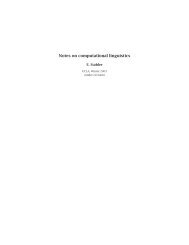Post Verbal Subjects and Agreement in Brazilian Portuguese
Post Verbal Subjects and Agreement in Brazilian Portuguese
Post Verbal Subjects and Agreement in Brazilian Portuguese
Create successful ePaper yourself
Turn your PDF publications into a flip-book with our unique Google optimized e-Paper software.
see Belletti (1988) for French <strong>and</strong> F<strong>in</strong>ish <strong>and</strong> Nunes (1995), Viotti (2000) <strong>and</strong><br />
Alvelar (2004) for BP). 23 Assum<strong>in</strong>g that just one of the DPs can check case from v<br />
(as it occurs with unaccusatives <strong>and</strong> existentials), the other DP <strong>in</strong> copular cases<br />
must raise out of vP to spec-TP. If pro-it raised to spec-TP <strong>in</strong>stead, one of the DPs<br />
would not check case, deriv<strong>in</strong>g the ungrammatically <strong>in</strong> (83).<br />
Thus, I have accounted for copular agreement for all three possibilities<br />
available <strong>in</strong> unaccusative <strong>and</strong> existential environments. As <strong>in</strong> unaccusatives <strong>and</strong><br />
existentials, the predicate or the subject may raise to spec-TP. The possibility of<br />
leav<strong>in</strong>g both the subject <strong>and</strong> the predicate low (available with unaccusatives <strong>and</strong><br />
existentials) is excluded <strong>in</strong> copular environments because it would prevent one of<br />
the DPs present <strong>in</strong> these constructions to check case.<br />
However, there is still a case of copular sentences which has not been<br />
expla<strong>in</strong>ed: cases of predicate <strong>in</strong>version with subject verb agreement. I will follow<br />
Moro’s proposal for Italian, propos<strong>in</strong>g that the subject <strong>in</strong> these constructions is<br />
really pro-there, even though a full DP higher than pro-there is <strong>in</strong>terpreted as be<strong>in</strong>g<br />
the predicate. Moro proposes that the first overt DP <strong>in</strong> predicate <strong>in</strong>version cases <strong>in</strong><br />
23 Although the studies cited above have a <strong>in</strong> common the proposal for case low case check<strong>in</strong>g of the<br />
DP, the details differ. Some propose check<strong>in</strong>g via <strong>in</strong>herent or default case (Belletti (1988), Kato<br />
(2000a: 119-122). Others are closer to the implementation adopted here, by assum<strong>in</strong>g that case<br />
check<strong>in</strong>g is by a verbal head select<strong>in</strong>g the small clause (Nunes (1995), Viotti (2000), Rodriguez-<br />
Monedo (2005)). See also Sportiche (1995), who l<strong>in</strong>ks the ability of unaccusatives to license case to<br />
the post-verbal subject at a low position to movement of the unaccusative to a be verbal head sitt<strong>in</strong>g<br />
above the VP that <strong>in</strong>troduces the unaccusative.<br />
29

















